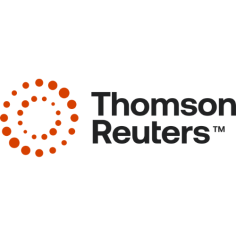AI set to save professionals 12 hours per week by 2029 according to Thomson Reuters
The Thomson Reuters Future of Professionals report shows knowledge workers are optimistic about significant boosts to productivity, with AI poised to redefine workflows, drive innovation, and unlock new opportunities for growth
- Critical time savings: Survey respondents predict AI to free up 12 hours per week within the next five years, with four hours per week saved in the next year alone – the equivalent of adding an additional colleague for every 10 team members. For a U.S. lawyer, this could translate to an additional $100,000 in billable hours.*
- Positive outlook on impacts of AI: 77% of professionals believe AI will have a high or transformational impact on their work over the next five years. Additionally, 78% say AI is a “force for good” in their profession, while 37% of respondents haven’t yet used GenAI in their work.
- Catalyst for innovation: 79% of professionals predict significant or moderate improvement in innovation within their companies over the next five years. Over that same period, they anticipate 56% of work will utilize new AI-powered technology.
- Strong appetite for AI standards: 57% of professionals believe certification processes for AI systems should be introduced, and 55% believe professional or industry bodies should make their own standards.
Thomson Reuters, a global content and technology company, today released its 2024 Future of Professionals report, an annual survey of more than 2,200 professionals working across legal, tax, and risk & compliance fields globally.
Respondents predicted that artificial intelligence (AI) has the potential to save them 12 hours per week in the next five years, or four hours per week over the upcoming year – equating to 200 hours annually. This timesaving potential is the equivalent productivity boost of adding an extra colleague for every 10 team members on staff. Harnessing the power of AI across various professions opens immense economic opportunities. For a U.S. lawyer, this could translate to an estimated $100,000 in additional billable hours.
The sharp uptick in interest in AI is a major catalyst for innovation across industries. Overall, 77% of professionals now predict AI will have a high or transformational impact on their work over the next five years, up 10 percentage points from last year. In addition, 79% anticipate innovation at their companies will increase.
“Professionals no longer need to speculate on the potential for AI to impact their work as they are now witnessing its effects firsthand. As we look to the future, one thing is clear: AI-empowered professionals and their companies will outpace those who resist this transformative era,” said Steve Hasker, President and CEO, Thomson Reuters. “With professionals predicting that AI will save them up to 200 hours in the next year, the potential economic impact is significant. For a U.S. lawyer, the time saved could translate to up to $100,000 a year in additional billable time, and we can expect similar productivity gains across other professions. The responsible use of AI is crucial, with nearly two-thirds of professionals stressing human oversight. As we navigate this change, we must remember the future of AI is ours to shape.”
This year’s study underscores the overwhelming sense of enthusiasm professionals have for AI. AI, and specifically generative AI (GenAI), solutions for the legal, tax, and risk & compliance sectors have been among the most widely adopted categories of professional-grade AI applications to date. In fact, 63% of those surveyed are already using AI-powered technologies as a starting point for tasks, with research, summarization, and drafting cited as the most common use cases.
The report’s findings are categorized into three main themes: productivity, responsibility, and value. The following are some of the study’s key insights:
Productivity:
- Key driver of innovation, job growth and improved productivity: The top areas professionals expect to see concrete improvements over the next five years are “more innovation” (79%), “more time spent on engaging, judgement-based or expertise-driven work” (66%), “greater opportunity for continual skill building” (57%), and “improved work-life balance” (51%).
- AI as top strategic priority for legal profession: Asked to indicate their strategic priorities for the next 18 months, 50% of law firm respondents selected AI in their top five, edging out productivity (49%). The top areas where corporate C-suite respondents anticipate AI will have the biggest impact are operational strategy (59%), product/service strategy (53%), and talent strategy (40%).
Responsibility:
- AI holdouts seek guidance from their employers: While the majority (63%) of respondents are already using AI-powered technologies as a starting point for tasks, 37% of those surveyed have not tried the technology in their work. Among the top reasons for staying on the sidelines, 35% are unsure what type of work the technology can be used for and 28% are unsure how to access it.
- Responsible use of AI is crucial: The vast majority (95%) of professionals agree it’s a step too far to allow AI to represent clients in court or make final decisions on complex legal, tax and risk, fraud & compliance matters. Areas where professionals are more comfortable with AI include drafting basic documents, research and analysis, and basic administrative tasks. A majority (57%) of respondents say certification processes for AI systems should be introduced, and 55% believe professional or industry bodies should be tasked with developing these standards.
Value:
- AI and data to have transformational impact on professional services: When asked the impact of various trends over the next five years, respondents overwhelmingly identified “the rise of AI and GenAI” as having the greatest impact (77% predicting high or transformational impact), followed by “explosion in data volumes” (59%).
- Positive market sentiment and transformative potential: Professionals view AI as a “force for good” (78%), recognizing its potential to enhance efficiency and bring new value to their work. With widespread adoption, we could see AI drive significant innovation, improve work-life balance, and provide substantial economic benefits over the next five years.
To access the full report, visit https://www.thomsonreuters.com/en/c/future-of-professionals.html.



